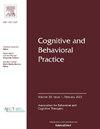Using an App-Based Mindfulness Intervention: A Mixed Methods Approach
IF 2.9
3区 心理学
Q1 PSYCHOLOGY, CLINICAL
引用次数: 0
Abstract
Mindfulness-based practices are often utilized and substantial research supports the continued use of these practices as effective interventions. Mindfulness interventions that utilize focused breathing, app-based guidance, and brief duration may present mental health benefits. However, examining individuals’ unique experiences from continued engagement in brief app-based mindfulness interventions over time, as well as identifying potential barriers preventing the use, is understudied. The current study utilized a longitudinal mixed method design to understand the experiences of individuals using a widely available app-based (i.e., Apple Watch) mindfulness breathing intervention over a 2-week period by identifying the thematic patterns common among the individuals and how this affected their levels of depression, anxiety, and coping skills over time. Qualitative analysis revealed a general positive experience among the participants, as well as the importance of personalization related to mindfulness interventions. Quantitative findings indicated a significant increase in coping skills, but no substantial change in their levels of depression or anxiety after 2 weeks. Researchers should continue examining interventions that include the core aspects of mindfulness, while exploring variations of mindfulness duration, frequency, total length, and breath rate to determine maximum efficacy. Practice-based interventions should focus on the effective ways to implement app-based self-guided mindfulness interventions, such as being short in duration, personalized for daily use, and aligning the practice with key components of mindfulness.
使用基于应用程序的正念干预:混合方法
基于正念的练习经常被使用,大量的研究支持继续使用这些练习作为有效的干预措施。正念干预利用集中呼吸、基于应用程序的指导和短暂的持续时间可能会带来心理健康益处。然而,随着时间的推移,通过持续参与基于应用程序的简短正念干预来检查个人的独特体验,以及识别阻止使用的潜在障碍,目前还没有得到充分的研究。目前的研究采用纵向混合方法设计,通过确定个体之间常见的主题模式,以及随着时间的推移,这如何影响他们的抑郁、焦虑水平和应对技能,了解个体在两周内使用广泛使用的基于应用程序(即Apple Watch)的正念呼吸干预的体验。定性分析揭示了参与者普遍的积极体验,以及与正念干预相关的个性化的重要性。定量研究结果表明,两周后,他们的应对技能显著提高,但抑郁或焦虑水平没有实质性变化。研究人员应该继续研究包括正念核心方面的干预措施,同时探索正念持续时间、频率、总长度和呼吸频率的变化,以确定最大功效。基于实践的干预应侧重于实施基于应用程序的自我引导正念干预的有效方法,例如持续时间短,日常使用个性化,以及将练习与正念的关键组成部分相结合。
本文章由计算机程序翻译,如有差异,请以英文原文为准。
求助全文
约1分钟内获得全文
求助全文
来源期刊

Cognitive and Behavioral Practice
PSYCHOLOGY, CLINICAL-
CiteScore
4.80
自引率
3.40%
发文量
118
审稿时长
84 days
期刊介绍:
Cognitive and Behavioral Practice is a quarterly international journal that serves an enduring resource for empirically informed methods of clinical practice. Its mission is to bridge the gap between published research and the actual clinical practice of cognitive behavior therapy. Cognitive and Behavioral Practice publishes clinically rich accounts of innovative assessment and diagnostic and therapeutic procedures that are clearly grounded in empirical research. A focus on application and implementation of procedures is maintained.
 求助内容:
求助内容: 应助结果提醒方式:
应助结果提醒方式:


